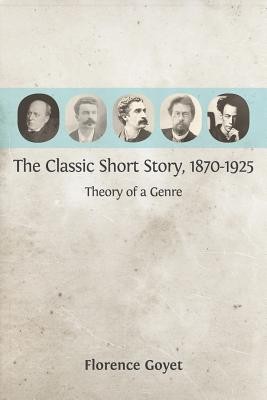
- We will send in 10–14 business days.
- Author: Florence Goyet
- Publisher: Open Book Publishers
- Year: 2014
- Pages: 220
- ISBN-10: 1909254754
- ISBN-13: 9781909254756
- Format: 15.6 x 23.4 x 1.2 cm, minkšti viršeliai
- Language: English
- SAVE -10% with code: EXTRA
Reviews
Description
The ability to construct a nuanced narrative or complex character in the constrained form of the short story has sometimes been seen as the ultimate test of an author's creativity. Yet during the time when the short story was at its most popular-the late nineteenth and early twentieth centuries-even the greatest writers followed strict generic conventions that were far from subtle. This expanded and updated translation of Florence Goyet's influential La Nouvelle, 1870-1925: Description d'un genre à son apogée (Paris, 1993) is the only study to focus exclusively on this classic period across different continents. Ranging through French, English, Italian, Russian and Japanese writing-particularly the stories of Guy de Maupassant, Henry James, Giovanni Verga, Anton Chekhov and Akutagawa Ryūnosuke-Goyet shows that these authors were able to create brilliant and successful short stories using the very simple 'tools of brevity' of that period. In this challenging and far-reaching study, Goyet looks at classic short stories in the context in which they were read at the time: cheap newspapers and higher-end periodicals. She demonstrates that, despite the apparent intention of these stories to question bourgeois ideals, they mostly affirmed the prejudices of their readers. In doing so, her book forces us to re-think our preconceptions about this 'forgotten' genre.
EXTRA 10 % discount with code: EXTRA
The promotion ends in 21d.11:28:24
The discount code is valid when purchasing from 10 €. Discounts do not stack.
- Author: Florence Goyet
- Publisher: Open Book Publishers
- Year: 2014
- Pages: 220
- ISBN-10: 1909254754
- ISBN-13: 9781909254756
- Format: 15.6 x 23.4 x 1.2 cm, minkšti viršeliai
- Language: English English
The ability to construct a nuanced narrative or complex character in the constrained form of the short story has sometimes been seen as the ultimate test of an author's creativity. Yet during the time when the short story was at its most popular-the late nineteenth and early twentieth centuries-even the greatest writers followed strict generic conventions that were far from subtle. This expanded and updated translation of Florence Goyet's influential La Nouvelle, 1870-1925: Description d'un genre à son apogée (Paris, 1993) is the only study to focus exclusively on this classic period across different continents. Ranging through French, English, Italian, Russian and Japanese writing-particularly the stories of Guy de Maupassant, Henry James, Giovanni Verga, Anton Chekhov and Akutagawa Ryūnosuke-Goyet shows that these authors were able to create brilliant and successful short stories using the very simple 'tools of brevity' of that period. In this challenging and far-reaching study, Goyet looks at classic short stories in the context in which they were read at the time: cheap newspapers and higher-end periodicals. She demonstrates that, despite the apparent intention of these stories to question bourgeois ideals, they mostly affirmed the prejudices of their readers. In doing so, her book forces us to re-think our preconceptions about this 'forgotten' genre.


Reviews